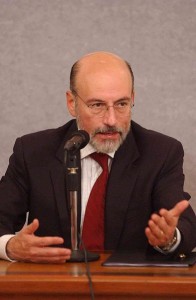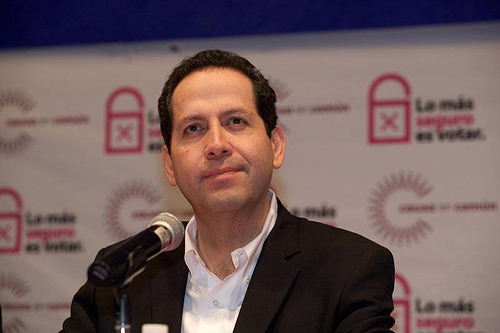On July 3, 2011, the electoral process for choosing a governor will unfold in the State of Mexico (Edomex), led by Enrique Peña Nieto from the Institutional Revolutionary Party (PRI).
Three candidates remain in this electoral competition: Luis Felipe Bravo Mena from the National Action Party (PAN), Eruviel Ávila Villegas from the PRI, leading the “United for you” coalition, and Alejandro Encinas Rodríguez from the Party of the Democratic Revolution (PRD), representing the so-called “United we can do more” coalition.
Juan José Solis [es], for blog Hispanic LA, notes the relevance of this local electoral process and signals an aspect that, in his opinion, should not go unnoticed:
En ese sentido, la elección del Edomex más que ser un laboratorio de resultados electorales, es un escenario de prácticas discursivas y de demoscopia de la percepción, para los pretendientes a ocupar la presidencia de la República.
Por lo que se ve (y se mide), las elecciones en el Edomex no serán reñidas, como no lo han sido nunca. Pero lo que hagan los candidatos presidenciales en torno a esta elección, es lo que realmente no debemos perder de vista, ya que de ahí saldrán los aspirantes que estén mejor entrenados para enfrentar una contienda que se avizora de alto contenido de “guerra sucia”… y por ello de varios capítulos políticos por escribir.
In this sense, the Edomex election, more than being a laboratory of electoral results, is a scenario of discursive practices and an opinion poll of perception for the candidates aiming to occupy the presidency of the Republic.
Going by that which is seen (and measured), the elections in Edomex will not be close, as they have never been in the past. But that which the presidential candidates do surrounding this election is that which we truly cannot not lose sight of, since the best contenders will emerge from here, ready to confront a competition that is envisioned with a high content of “dirty warfare”… and as a result, various political chapters are to be written.
Regarding the same topic, the aforementioned author expresses his considerations with respect to the proposals of the contenders for governing the entity in question:
En la oferta y los discursos que al momento se han vertido en las distintas estrategias de campaña, no hay un solo candidato que ofrezca un verdadero plan y dotes de gobierno que de solución a los complejos problemas de la entidad. Hasta el momento, lo que se tiene es mera retórica y promesas que difícilmente se podrán materializar. Algunos ofrecimientos vagos por ejemplo, son el de firmar ante notario las promesas de gobierno, estrategia que busca seducir al ciudadano mexiquense para que crea que el compromiso adquirido tendrá una obligación de carácter legal por tener el soporte notarial de por medio, siendo que en la realidad, nada obliga al candidato a cumplir los acuerdos firmados, pues lo único que hace el notario es dar fe de la firma, pero no la circunscribe a ningún marco ejecutorio de carácter legal.
A blog of radical nature like Círculo de estudios Coapa [es] notes its perception of the local electoral process set for July 3, 2011 and its relevance, with sights on the presidential succession next year:
La burguesía intentará por todos los medios evitar que la izquierda llegue a la presidencia en el 2012; banqueros, empresarios, terratenientes, narcotraficantes, el imperialismo, para todos ellos no hay peor pesadilla posible que perder las elecciones presidenciales, un golpe así pondría en cuestionamiento sus intereses y su sistema de dominación. Por ello se aferrarán con uñas y dientes a la gubernatura del Edomex luchando por el triunfo Eruviel Ávila en las próximas elecciones estatales del 3 de julio, representando el primer paso para confrontar a la izquierda de cara a las presidenciales del 2012.
Other members of the national blogosphere express their opinion in a categorical manner, with respect to each of the candidates; such is the case of Arcadio González [es], who highlighted the following for his blog, Nuestro México bizarro (“Our Bizarre Mexico”) [es]:
Por lo que hace a los dos primeros candidatos, el del PAN Luis Felipe Bravo Mena y el del PRD Alejandro de Jesús Encinas Rodríguez, no sé si REIR o LLORAR por su obstinación de volver a ser candidatos al Gobierno del Estado de México 18 años después, cuando tan sólo tuvieron el 17.89% y el 8.73%, respectivamente, de la votación total en el año 1993.
Del candidato del PRI Eruviel Ávila Villegas no hay la menor duda de que es una persona preparada y exitosa, pues en su vida política ha ganado sus candidaturas por elección y mayoría de votos, no como los anteriores candidatos. Es el único de los tres que nació en el Estado de México y el único de los tres que conoce verdaderamente la problemática de su Estado y Municipios, pues su trabajo ha estado en torno al mismo Estado de México, siempre PRIísta y convencido de su ideología, o por lo menos, no ha cambiado de partido, lo que para muchos puede ser su defecto, pero si analizamos un poco, en realidad es su virtud.
Looking at the first two candidates, the one from PAN, Luis Felipe Bravo Mena, and the one from PRD, Alejandro de Jesús Encinas Rodríguez, I don't know if I should LAUGH or CRY for their tenacity to become contenders for the Government of the State of Mexico 18 years after, when they only had 17.89% and 8.73%, respectively, of the total votes in 1993.
There is not the slightest doubt that PRI candidate Eruviel Ávila Villegas, a prepared and successful person, that throughout his political life, has won his candidacies for election and the majority vote, unlike the previous candidates. He is the only one of the three that was born in the State of Mexico and the only of the three that truly knows the problems of his State and Municipalities, and his work has revolved around the very State of Mexico, always leaning towards PRI and has been convinced of his ideology, or at least, has not changed parties, which for many can be his defect, but if we analyze it a little bit, in reality it is his virtue.
Analysts like Juan José Rodríguez Prats [es] (whose contribution on the topic can be found in the blog, La voz de la región) criticize the PRI candidate's campaign:
En el Estado de México, como en otras entidades, se está matando la conciencia ciudadana. La publicidad de Eruviel Ávila en su ambición por alcanzar la gubernatura resulta aplastante, avasalladora. Hacia donde dirija uno la vista, se localiza algo en relación al candidato del PRI. Si alardean de su enorme ventaja en las encuestas, ¿qué caso tiene ese enorme derroche de recursos?
Additionally, Rodríguez Prats makes mention of that which according to his understanding would be a possible consequence of Eruviel Ávila favorable standing in the approaching elections:
En el Estado de México, al igual que en Coahuila y en Nayarit, está latente una enorme amenaza de regresión al más viejo autoritarismo y a la rancia corrupción producto de la imbricación PRI-gobiernos estatales. Contrario a sus orígenes, en los que desde el centro se tomaban decisiones, ahora los gobernadores son amos y señores en su entidad.
Es obvio que analizo el desempeño de los tres candidatos en el Estado de México desde mi trinchera partidista, pero lo cierto es que no he encontrado en el priista ningún argumento convincente para el apoyo ciudadano del que presume. Lo único que percibo es el peso del dinero y el apoyo incondicional y abrumador del aparato gubernamental mexiquense, como quedó demostrado en aquel video que, como tantas otras pruebas evidentes, fue desechado por los órganos electorales.
In the State of Mexico, as in Coahuila and Nayarit, there is a latent, enormous threat of regression to old authoritarianism and rancid corruption, a product of the PRI-state government imbrication. Contrary to its origins in those which take their decisions from the center, now the governors are masters and lords in their entities.
It's obvious that I analyze the performance of the three candidates in the State of Mexico from my trench party, but the truth is that I have not found any convincing PRI argument for citizen support from the one that presumes. The only thing I perceive is the weight of money as well as the unconditional and overwhelming support for the Mexican governmental apparatus, as demonstrated in that video that, as so much other evidence, was rejected by electoral organs.
To conclude, it is important to mention that one month before the elections, the Center For Strategic & International Studies reported that candidate Eruviel Ávila had 45% of the electorate's approval according to a survey done at the end of May. On the other hand, 12 days before the election, Strategic Communication Cabinet [es] reports that according to its daily survey, the PRI candidate has 52% of the preferred votes, while candidates from PRD and PAN have 20.2% and 13.2% respectively.
In a democratic system like that of Mexico, the voters are the ones that will have the last word and will have to assert it in the polls accordingly.










3 comments